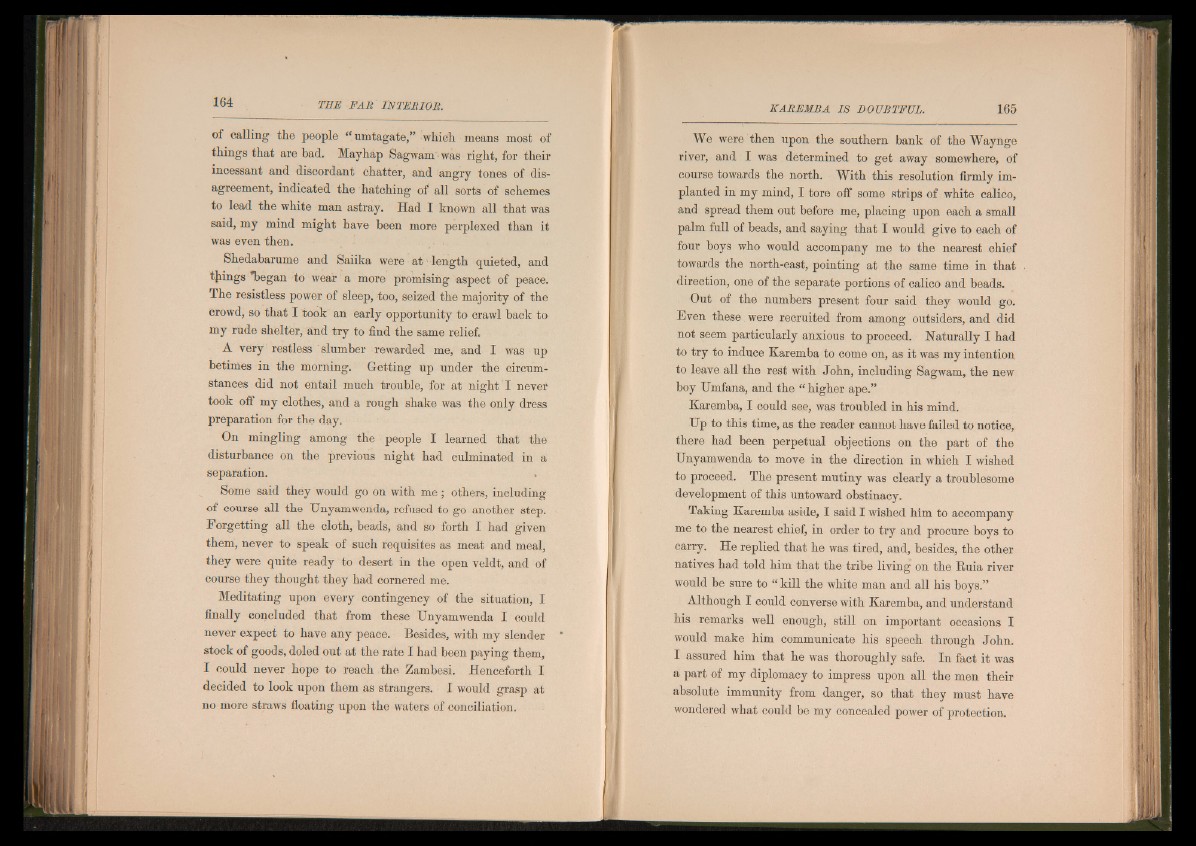
of calling the people “ umtagate,” which means most of
things that are bad. Mayhap Sagwamwas right, for their
incessant and discordant chatter, and angry tones of disagreement,
indicated the hatching of all sorts of schemes
to lead the white man astray. Had I known all that was
said, my mind might have been more perplexed than it
was even then.
Shedabarume and Saiika were at length quieted, and
tjrings *began to wear a more promising aspect of peace.
The resistless power of sleep, too, Seized the majority of the
crowd, so that I took an early opportunity to crawl back to
my rude shelter, and try to find the same relief.
A very restless slumber rewarded me, and I was up
betimes in the morning. Getting up under the circumstances
did not entail much trouble, for at night I never
took off my clothes, and a rough shake was the only dress
preparation for the day.
On mingling among the people I learned that the
disturbance on the previous night had culminated in a
separation. .
Some said they would go on with me ; others, including
of course all the IJnyamwenda, refused to go another step.
Forgetting all the cloth, beads, and so forth I had given
them, never to speak of such requisites as meat and meal,
they were quite ready to desert in the open veldt, and of
course they thought they had cornered me.
Meditating upon every contingency of the situation, I
finally concluded that from these Unyamwenda I could
never expect to have any peace. Besides, with my slender
stock of goods, doled out at the rate I had been paying them,
I could never hope to reach the Zambesi. Henceforth I
decided to look upon them as strangers. I would grasp at
no more straws floating upon the waters of conciliation.
We were then upon the southern bank of the Waynge
river, and I was determined to get away somewhere, of
course towards the north. With this resolution firmly implanted
in my mind, I tore off some strips of white calico,
and spread them out before me, placing upon each a small
palm full of beads, and saying that I would give to each of
four boys who would accompany me to the nearest chief
towards the north-east, pointing at the same time in that
direction, one of the separate portions of calico and beads.
Out of the numbers present four said they would go.
Even these were recruited from among outsiders, and did
not seem particularly anxious to proceed. Naturally I had
to try to induce Karemba to come on, as it was my intention
to leave all the rest with John, including Sagwam, the new
boy Umfana, and the “ higher ape.”
Karemba, I could see, was troubled in his mind.
Up to this time, as the reader cannot have failed to notice,
there had been perpetual objections on the part of the
Unyamwenda to move in the direction in which I wished
to proceed. The present mutiny was clearly a troublesome
development of this untoward obstinacy.
Taking Karemba aside, I said I wished him to accompany
me to the nearest chief, in order to try and procure boys to
carry. He replied that he was tired, and, besides, the other
natives had told him that the tribe living on the Ruia river
would be sure to “ kill the white man and all his boys.”
Although I could converse with Karemba, and understand
his remarks well enough, still on important occasions I
would make him communicate his speech through John.
I assured him that he was thoroughly safe. In fact it was
a part of my diplomacy to impress upon all the men their
absolute immunity from danger, so that they must have
wondered what could be my concealed power of protection.